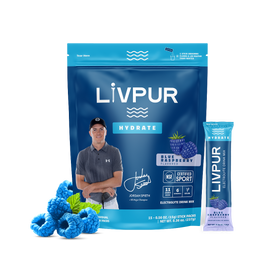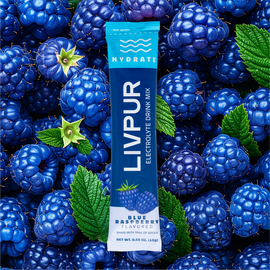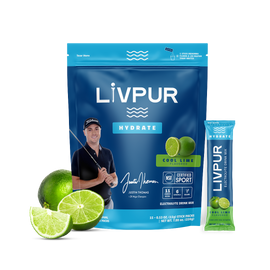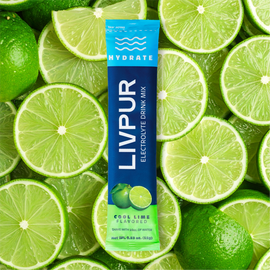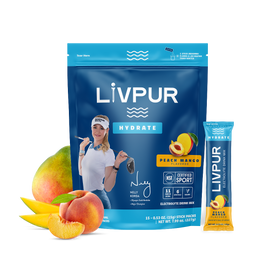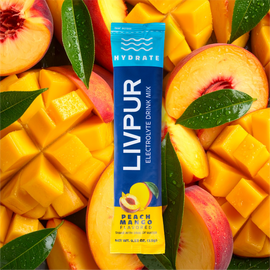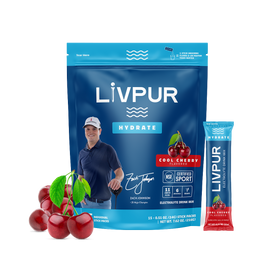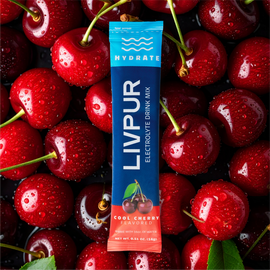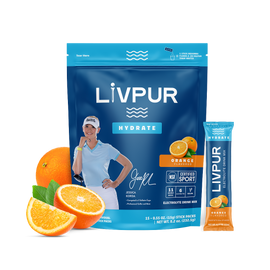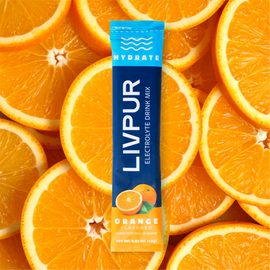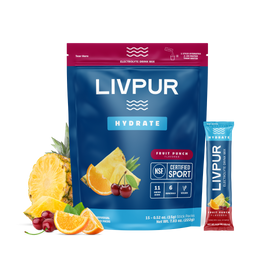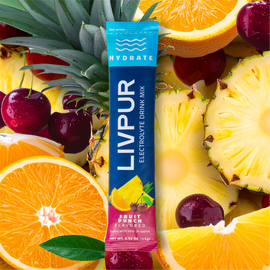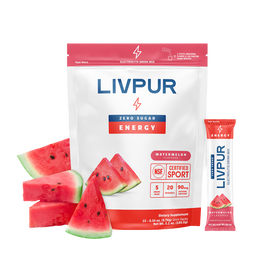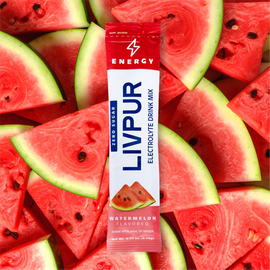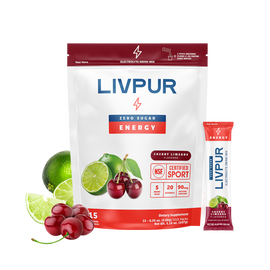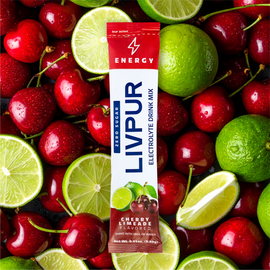August 07, 2025 • By Katie Switow • Blog
Hydration for Runners: What Your Body Really Needs
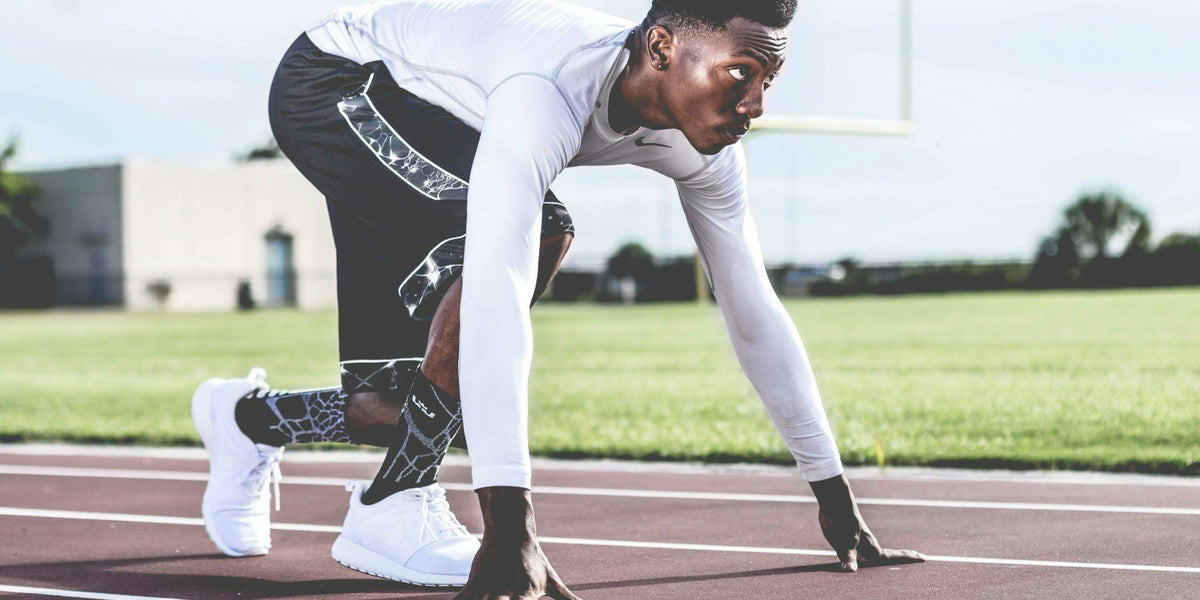
Hydration is a necessity when it comes to physical performance, particularly for runners. During exercise, the body loses water and electrolytes through sweat as a means of regulating temperature. Even mild dehydration (fluid loss of just 2% of body weight) can affect your endurance, increase perceived effort, and impact your body’s ability to regulate temperature. For runners, hydration is the key to staying comfortable, protecting performance, reducing injury risk, and supporting quick recovery.
The Role of Water
Water is essential to nearly every function in our body, and for runners, it’s even more critical. Drinking fluids helps to fuel a complex system that supports movement, energy, and endurance.
Water helps keep body temperatures in check by enabling sweat production and heat dissipation. It also plays a role in blood volume, helping the cardiovascular system send oxygen and nutrients to your muscles efficiently. If you’re not careful about your water intake, everything from your pace to your mood can take a hit.
Water supports the vital work happening behind the scenes in your organs. It cushions the brain and spinal cord, keeps the digestive system running smoothly by helping break down food and absorb nutrients, and helps your kidneys function properly to flush out waste. And not to mention, your joints rely on water for lubrication, which becomes especially important on high-impact runs.
Common Hydration Mistakes for Runners
It’s easy to slip up when it comes to hydration, and those small mistakes can have a big impact on performance, recovery, and overall health.
Here are some of the most common missteps runners make and some hydration tips to help you avoid them:
Waiting Until You’re Thirsty
For runners, waiting until you feel thirsty to drink water can be risky. Thirst is actually a delayed signal, meaning your body is already mildly dehydrated by the time you clock it. During a run, this can lead to dizziness, muscle cramps, or heat-related illnesses. By the time you feel thirsty, you’re likely already struggling to regulate temperature. That’s why hydrating throughout the day, and before a run, is an important prevention method.
Ignoring the Signs of Dehydration
We don’t always recognize dehydration when it strikes. Here are some common symptoms to look out for:
- Headache or lightheadedness
- Fatigue or unusual tiredness
- Dark yellow urine color
- Decreased urine output
- Muscle cramps or weakness
- Dry mouth or sticky feeling in the mouth
- Thirst
- Dizziness, especially when standing up quickly
- Rapid heart rate or breathing
- Difficulty concentrating or mental fog
If you’re experiencing more than one of these symptoms during or after a run, it’s a good idea to slow down, rehydrate, and assess whether you need electrolytes or a break from the heat.
Overhydrating Before You Run
Drinking too much water right before a run can backfire. You may end up feeling bloated or sluggish, and can force bathroom trips mid-run. Instead of chugging a large amount of water right before heading out, aim to hydrate consistently throughout the day and sip smaller amounts in the hour leading up to your run. This way you get what you need without overloading your system.
Relying Only on Plain Water
While we all know that water is important, it doesn’t contain the electrolytes your body loses through sweat, like sodium, potassium, magnesium, and chloride. If you try to replace lost fluids with plain water alone, it can lead to hyponatremia (when sodium levels in the blood are too low). This can cause nausea, confusion, headaches, and in severe cases, seizures or death.
That’s why electrolyte drinks or hydration powders are so important, especially for longer workouts.
Hydration Tips for Long Distance Runners
The old standard of “eight glasses a day” just doesn’t cut it for the marathon runners of the world. While 91 ounces a day for women and 125 ounces a day for men is a general guideline to follow, long distance runners can need more fluids to compensate for significantly higher sweat levels.
Consider adding 16–24 ounces of water for every hour of exercise, and tweak based on intensity and weather. Try to hydrate consistently throughout the day: start in the morning, sip before your run, and continue to drink water or a sports drink afterward to fully rehydrate and recover.
And pay close attention to your urine color (pale yellow is ideal) and energy, which are helpful indicators of whether you’re hydrated or not.
Why Electrolytes and Nutrients Are So Important
During a long run — especially one in hot weather — you’re also sweating out electrolytes and nutrients that help your body function at its best. Getting these nutrients back into your system is essential for keeping up energy and speeding up recovery.
Electrolytes:
-
Sodium
Helps with fluid balance and nerve function. It’s the primary electrolyte lost in sweat and crucial for preventing cramps and hyponatremia. -
Potassium
Works together with sodium to help muscle function and hydration levels. It also helps prevent muscle fatigue. -
Magnesium
Helps relax muscles and nerve signaling. Low levels can cause cramping or muscle weakness. -
Calcium
Essential for muscle contraction and bone health. It also helps activate enzymes involved in energy metabolism. -
Chloride
Works alongside sodium to help maintain fluid balance and is important for proper digestion and pH balance in the body.
Nutrients:
-
Amino acids
Important part of muscle tissue repair. Also helps reduce soreness post-workout. -
Vitamins B6 and B12
Key players in energy metabolism and red blood cell production, which are vital for endurance and oxygen delivery during runs. -
Vitamin C
An antioxidant that supports immune health and helps reduce inflammation and oxidative stress from intense workouts. -
Cluster Dextrin
Can help provide boosted energy without spiking blood sugar. Ideal for extended workouts and long-distance runs. -
Glucose
A simple sugar and your body’s preferred energy source during exercise, and helps prevent energy crashes.
LivPur’s Hydrate includes all of the above and adds real value for runners with its broad nutrient profile.
Benefits of Sports Drinks and Hydration Mixes
Sports and energy drinks, gels and mixes can be a convenient and effective way for runners to replenish fluids, electrolytes, and energy, especially during longer runs or workouts in hot conditions. Though it’s always a good idea to check the label: many contain added sugar and artificial flavors that can upset your stomach or spike blood sugar.
LivPur Hydrate and Energy mixes are gluten, dairy and soy free, and contain no artificial flavors, making them an ideal hydration option for runners. The single-serving stick packs fit easily into any hydration vest, water bottle, or travel bag so you can push yourself to the limits anytime and easily recover.
Focus on Post-Run Recovery
Recovery doesn’t end at the finish line. To help your body bounce back and get stronger, start by rehydrating with water and electrolytes within 30–60 minutes after your run — especially if it was long or intense.
Add some gentle stretching to avoid muscle tightness and make sure to get plenty of rest. Listening to your body and giving it time to repair will ensure you’re in great shape for your next race day.
Take Aways
Staying on top of hydration is a core part of a runner’s health and safety. That’s why many sports medicine experts emphasize hydration as one of the most important habits a runner can build.
After exercise, it’s important to replenish your electrolytes and nutrients to keep everything in balance, slowly hydrate throughout the day and make sure to get plenty of rest. If you do, you’ll be sure to hit new distance and pace goals and leave everyone in the dust.
